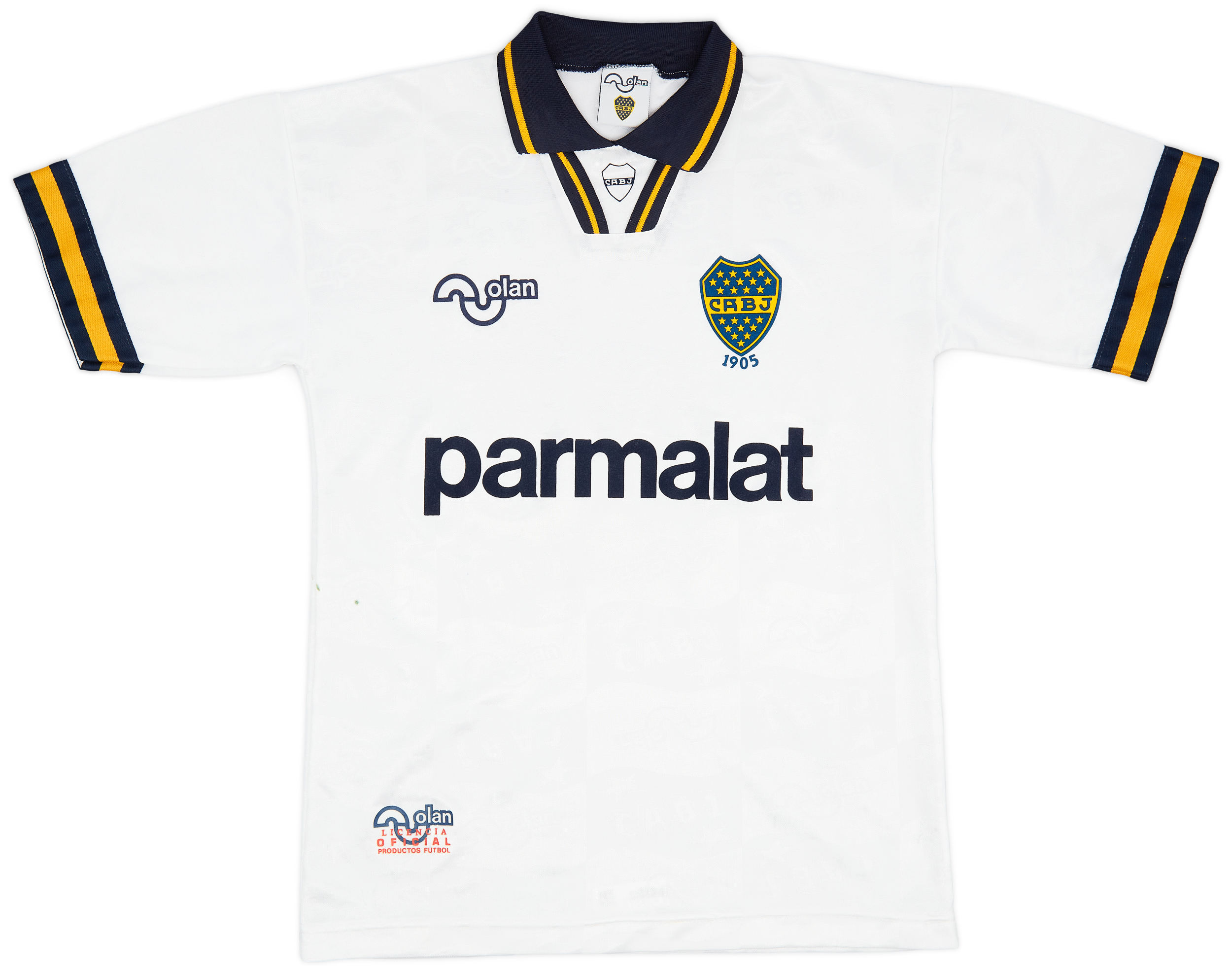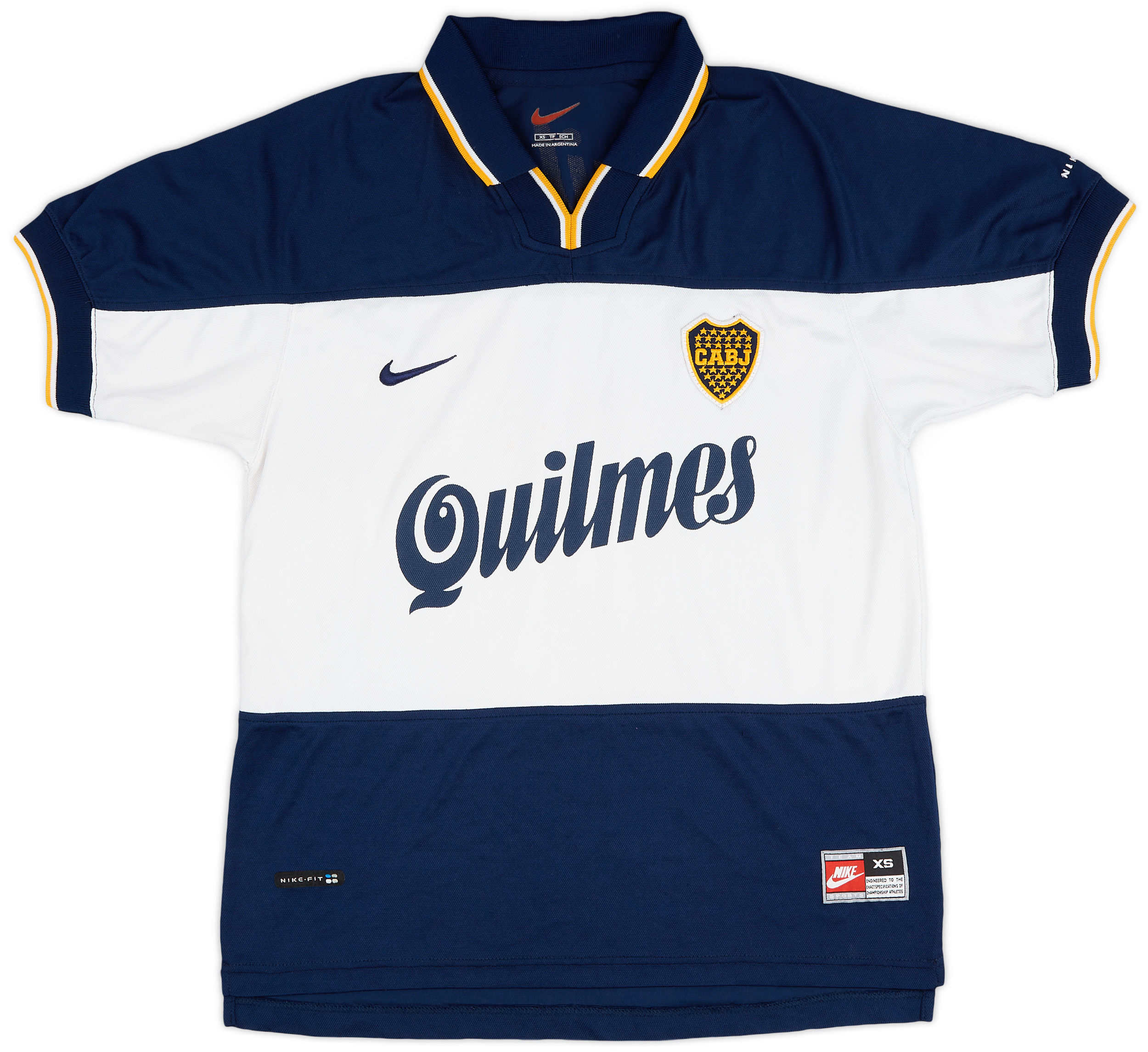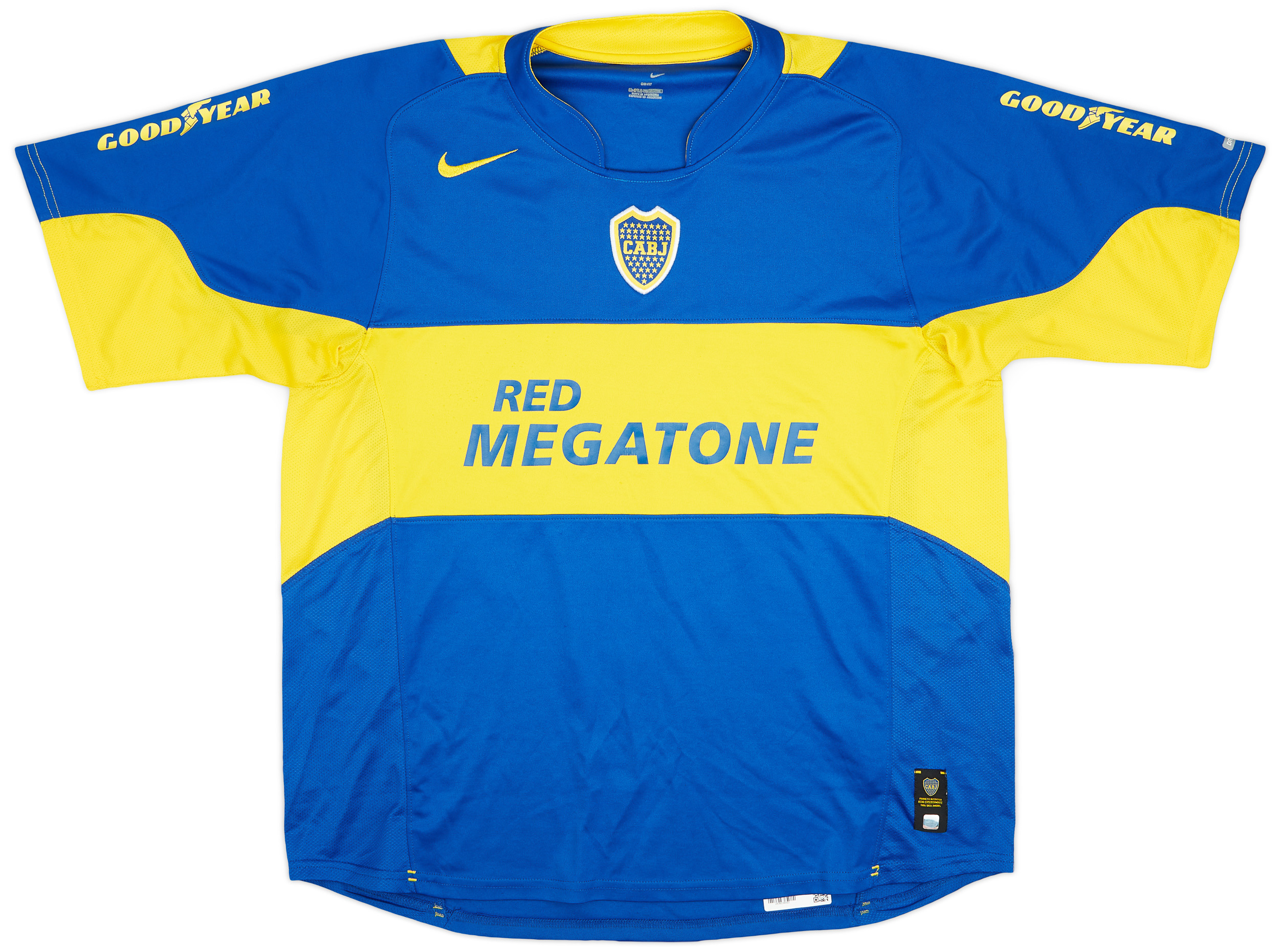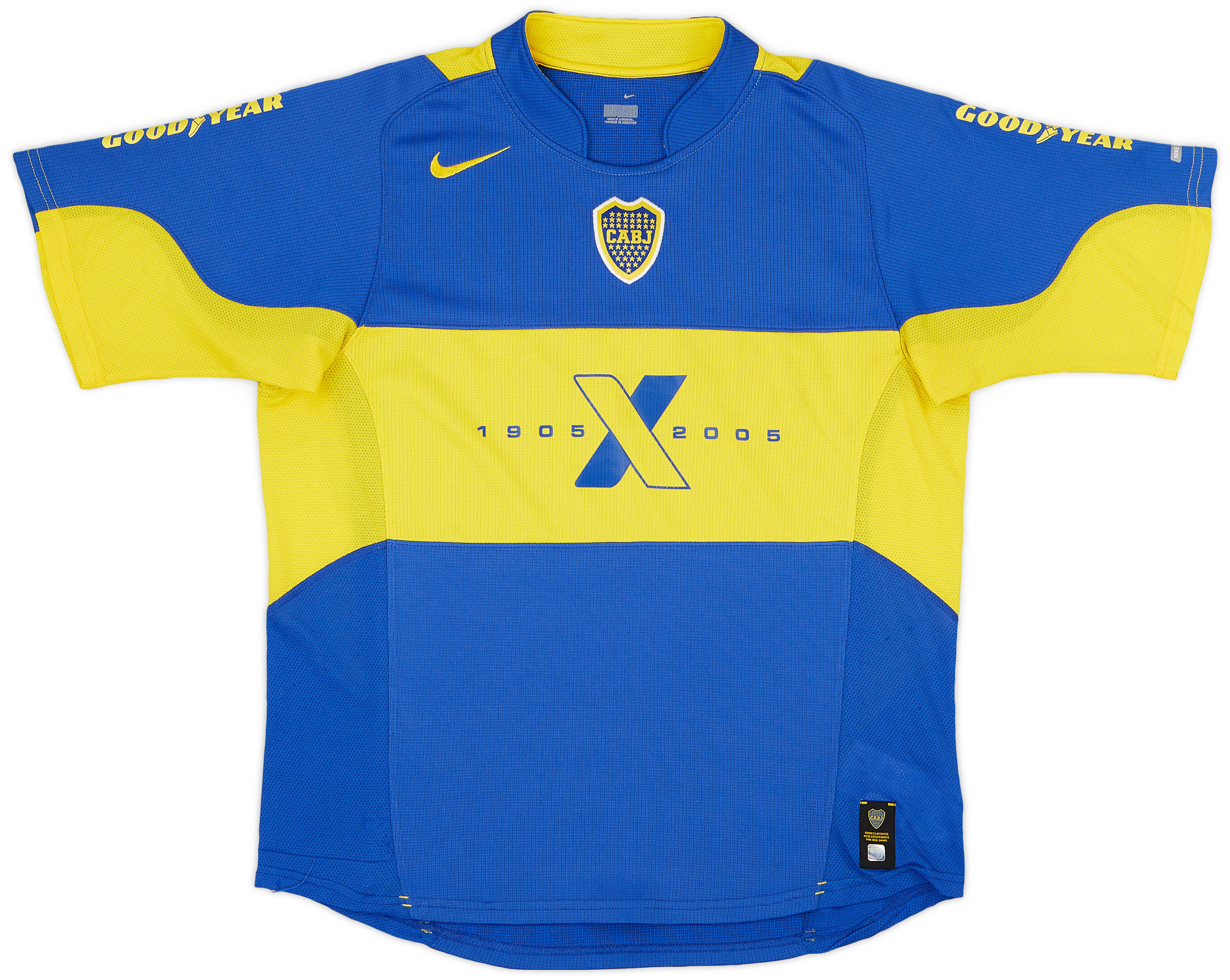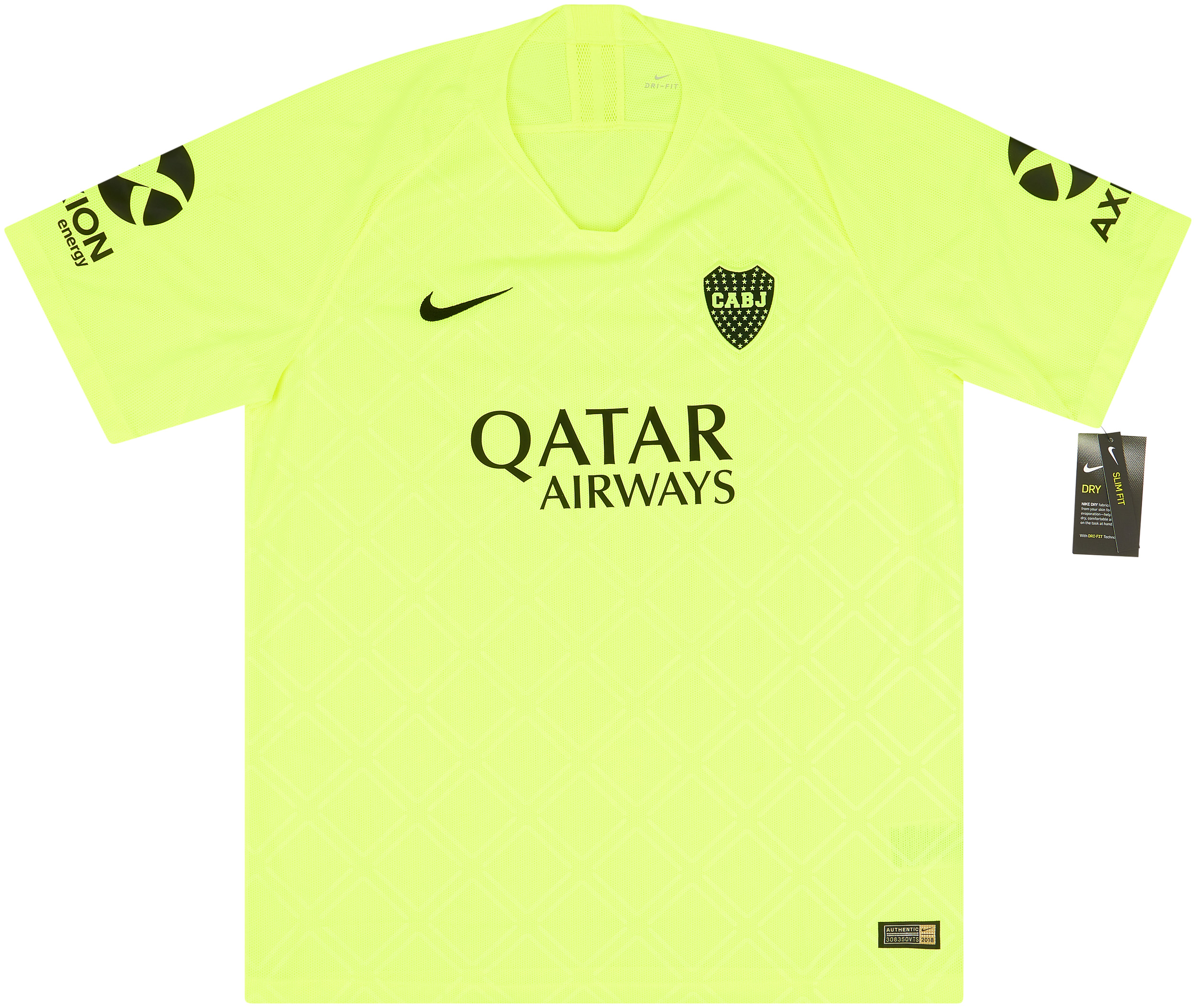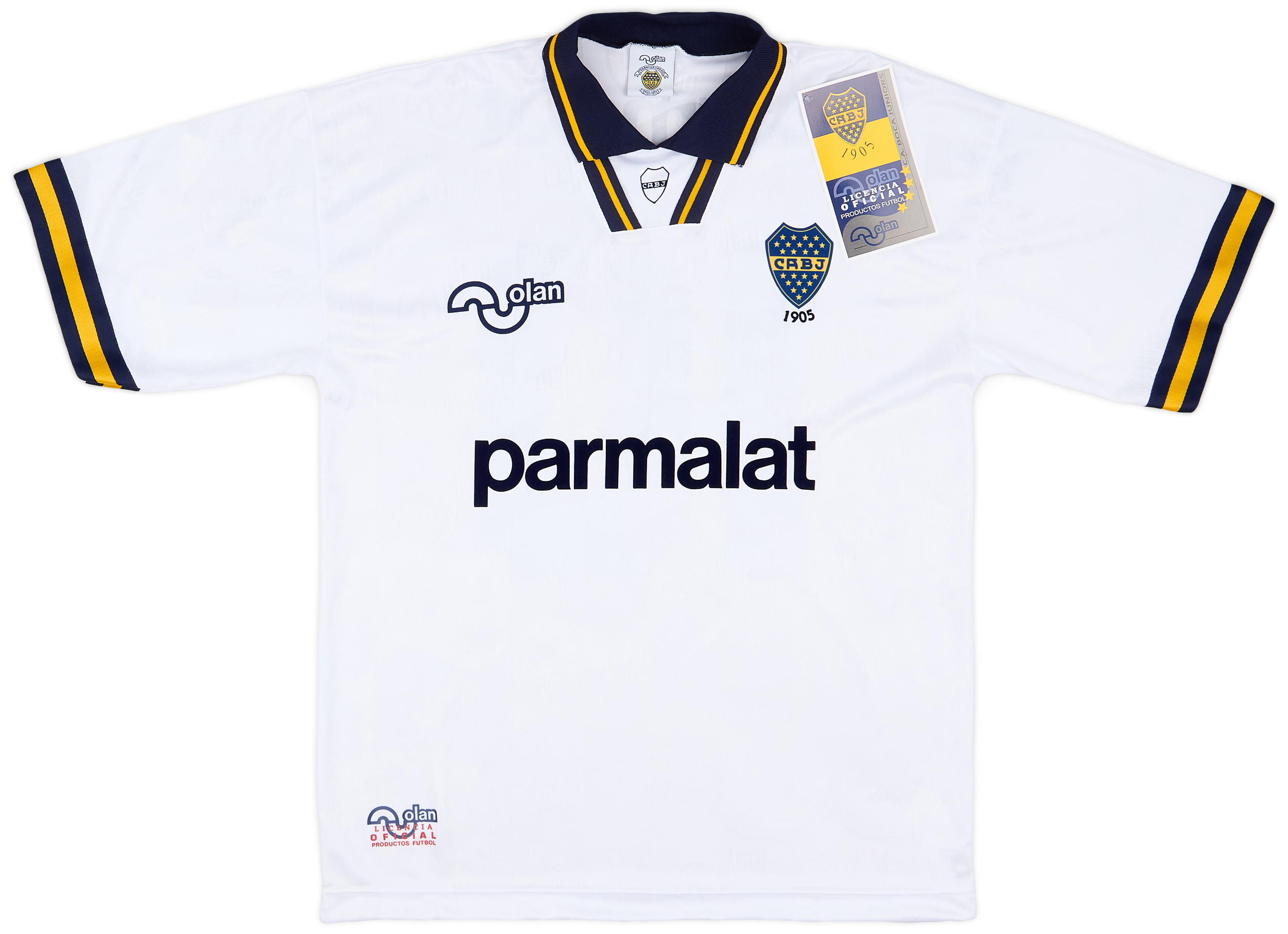Boca Juniors
Introduction Boca Juniors, one of Argentina’s most storied football clubs, embodies a rich history that intertwines with the cultural fabric of the nation. Founded in the heart of Buenos Aires in 1905, the club has become synonymous with Argentine football fame and fervor. Known for their iconic blue and gold colors, Boca Juniors is not […]
1995-97 Boca Juniors Home Shirt - 9/10 - (XL)
356.99£ - ca: €421
1994-95 Boca Juniors Home Shirt - 8/10 - (S)
356.99£ - ca: €421
1995-97 Boca Juniors Home Shirt - 9/10 - (L)
356.99£ - ca: €421
1995 Boca Juniors Away Shirt - 9/10 - (L)
296.99£ - ca: €350
1995 Boca Juniors Away Shirt #7 - 8/10 - (L)
296.99£ - ca: €350
1995 Boca Juniors Away Shirt - 8/10 - (S)
296.99£ - ca: €350
1995-97 Boca Juniors Home Shirt - 7/10 - (L)
296.99£ - ca: €350
2001-02 Boca Juniors Third Shirt Jorginho #3 - 9/10 - (S)
237.99£ - ca: €281
1991-92 Boca Juniors Home L/S Shirt - 5/10 - (S)
237.99£ - ca: €281
2000-01 Boca Juniors Away L/S Shirt - 8/10 - (S)
237.99£ - ca: €281
1998-00 Boca Juniors Away Shirt - 9/10 - (XS)
237.99£ - ca: €281
1998-00 Boca Juniors Home L/S Shirt - 7/10 - (S)
226.99£ - ca: €268
1991-92 Boca Juniors Home Shirt - 5/10 - (M)
207.99£ - ca: €245
1998-00 Boca Juniors Home Shirt - 7/10 - (S)
207.99£ - ca: €245
2001-02 Boca Juniors Home Shirt - 8/10 - (XL)
207.99£ - ca: €245
2001-02 Boca Juniors Home Shirt - 9/10 - (XL)
207.99£ - ca: €245
2001-02 Boca Juniors Home Shirt - 9/10 - (XL)
207.99£ - ca: €245
1995-97 Boca Juniors Home Shirt - 5/10 - (XL)
177.99£ - ca: €210
1998-00 Boca Juniors Home Shirt - 8/10 - (XS)
177.99£ - ca: €210
2001-02 Boca Juniors Away Shirt - 9/10 - (S)
177.99£ - ca: €210
2000-01 Boca Juniors Home Shirt - 6/10 - (L)
177.99£ - ca: €210
2000-01 Boca Juniors Home Shirt - 6/10 - (XL)
177.99£ - ca: €210
2005 Boca Juniors Home Shirt - 9/10 - (S)
148.99£ - ca: €176
2005 Boca Juniors Home Shirt - 8/10 - (XL)
148.99£ - ca: €176
2005 Boca Juniors Home Shirt - 8/10 - (L)
148.99£ - ca: €176
2005 Boca Juniors Home Shirt - 9/10 - (S)
148.99£ - ca: €176
2007-08 Boca Juniors Home Shirt - 9/10 - (L)
148.99£ - ca: €176
2015-16 Boca Juniors Authentic Away Shirt - 8/10 - (S)
148.99£ - ca: €176
2005 Boca Juniors Home Shirt - 9/10 - (S)
148.99£ - ca: €176
2005-06 Boca Juniors Centenary Home Shirt - 8/10 - (S)
148.99£ - ca: €176
2018-19 Boca Juniors Authentic Third Shirt (XL)
148.99£ - ca: €176
2005 Boca Juniors Home Shirt - 8/10 - (L)
148.99£ - ca: €176
2005 Boca Juniors Home Shirt - 6/10 - (XL)
129.99£ - ca: €153
2016-17 Boca Juniors Home Shirt - 6/10 - (M)
118.99£ - ca: €140
2018-19 Boca Juniors Third Shirt Nandez #15 - 8/10 - (M)
118.99£ - ca: €140
2005 Boca Juniors Home Shirt - 7/10 - (L)
118.99£ - ca: €140
2022 Boca Juniors Third Shirt Zeballos #7 (XXL)
118.99£ - ca: €140
2005 Boca Juniors Home Shirt - 7/10 - (XL)
118.99£ - ca: €140
2005 Boca Juniors Home Shirt - 7/10 - (XL)
118.99£ - ca: €140
2011-12 Boca Juniors Home Shirt - 9/10 - (S)
118.99£ - ca: €140
2011-12 Boca Juniors Home Shirt - 9/10 - (L)
118.99£ - ca: €140
2007-08 Boca Juniors Home Shirt - 7/10 - (XL)
118.99£ - ca: €140
1998-00 Boca Juniors Home Shirt - 5/10 - (M)
118.99£ - ca: €140
2018-19 Boca Juniors Player Issue Third Shirt (XL)
118.99£ - ca: €140
1995-96 Boca Juniors Olan Reissue Away Shirt #10 (Maradona)
109.99£ - ca: €130
2018-19 Boca Juniors Authentic Third Shirt - 10/10 - (XL)
106.99£ - ca: €126
1992-93 Boca Juniors Home Shirt - 4/10 - (L)
106.99£ - ca: €126
2008-09 Boca Juniors Away Shirt - 8/10 - (S)
106.99£ - ca: €126
2009-10 Boca Juniors Home Shirt - 7/10 - (XXL)
106.99£ - ca: €126
2011-12 Boca Juniors Third Shirt - 7/10 - (S)
106.99£ - ca: €126
2022 Boca Juniors Third Shirt (S)
106.99£ - ca: €126
2016-17 Boca Juniors Away Shirt - 8/10 - (M)
106.99£ - ca: €126
2008-09 Boca Juniors Home Shirt #9 - 10/10 - (XL)
94.99£ - ca: €112
2020-21 Boca Juniors Third Shirt - 8/10 - (L)
94.99£ - ca: €112
2024-25 Boca Juniors Third Shirt
94.99£ - ca: €112
2009-11 Boca Juniors Away Shirt - 7/10 - (S)
94.99£ - ca: €112
1994-95 Boca Juniors Olan Reissue GK Shirt
94.99£ - ca: €112
2024-25 Boca Juniors Third Shirt Cavani #10
89.99£ - ca: €106
1992-93 Boca Juniors Olan Reissue GK Shirt
82.99£ - ca: €98
2023-24 Boca Juniors adidas Woven Jacket
82.99£ - ca: €98
2018-19 Boca Juniors Third Shirt - 9/10 - (S)
82.99£ - ca: €98
2008-09 Boca Juniors Home Shirt - 6/10 - (L)
82.99£ - ca: €98
2005 Boca Juniors Home Shirt - 6/10 - (XL.Boys)
82.99£ - ca: €98
2023-24 Boca Juniors adidas Training Pants/Bottoms
76.99£ - ca: €91
2022 Boca Juniors Third Shirt (S)
70.99£ - ca: €84
2021-22 Boca Juniors adidas Teamgeist Training Pants/Bottoms
58.99£ - ca: €70
2008-09 Boca Juniors Home Shirt - 5/10 - (S)
58.99£ - ca: €70
2020-21 Boca Juniors adidas Cotton Tee (S)
53.99£ - ca: €64
2020-21 Boca Juniors adidas Cotton Tee (S)
53.99£ - ca: €64
2023 Boca Juniors adidas Historical Shirt
47.99£ - ca: €57
1995-96 Boca Juniors Olan Reissue Home Short
44.99£ - ca: €53
1995-96 Boca Juniors Olan Reissue GK Shorts
41.99£ - ca: €50
2007-08 Boca Juniors Nike Training Shirt - 9/10 - (L)
35.99£ - ca: €42
Warning: A non-numeric value encountered in /var/www/netskribent.dk/retro-football-shirt.com/wp-content/themes/boot5/single-clubs.php on line 148
Introduction
Boca Juniors, one of Argentina’s most storied football clubs, embodies a rich history that intertwines with the cultural fabric of the nation. Founded in the heart of Buenos Aires in 1905, the club has become synonymous with Argentine football fame and fervor. Known for their iconic blue and gold colors, Boca Juniors is not just a football team; it represents passion, pride, and an unwavering spirit. The club’s reputation extends beyond the borders of Argentina, making it a symbol of success and determination in the world of football.
Club History
Boca Juniors was founded on April 3, 1905, by a group of Italian immigrants who sought to create a football club that reflected their heritage. The team initially played in various local leagues until they joined the Argentine Football Association in 1913. The early years were marked by struggles for recognition, but Boca Juniors quickly established itself as a competitive force in Argentine football. By the 1920s, the club had begun to find success, winning its first league title in 1919.
Significant moments in Boca Juniors’ history include the completion of the La Bombonera stadium in 1940. This uniquely shaped venue, with a capacity of over 54,000, has become an iconic landmark, known for its deafening atmosphere during home matches. Boca Juniors’ identity has always been tied to its passionate supporters, who create an electrifying environment that is celebrated in football lore.
Achievements
Boca Juniors boasts an impressive record of achievements, making it one of the most decorated clubs in South America. In domestic competitions, the team has secured a staggering 34 Primera División titles, with their most recent victory in 2019. They have also lifted the Copa Argentina trophy three times and the Supercopa Argentina twice.
On the international stage, Boca Juniors is particularly renowned for its prowess in the Copa Libertadores, South America’s premier club tournament. The club has won the Copa Libertadores a record six times (as of 2023), with triumphs in 1977, 1978, 2000, 2001, 2003, and 2007. Boca Juniors’ victories on this stage have solidified its status as a titan in international football, earning the respect of fans and critics alike.
Significant Players and Matches
Throughout its history, Boca Juniors has been home to numerous legendary players who have left an indelible mark on the club and the sport. Among them, Diego Maradona stands out as a global icon, having played for Boca during the early 1980s. His influence on the club and Argentine football is immeasurable. Other notable players include Juan Román Riquelme, a midfield maestro whose vision and creativity defined an era for Boca Juniors, and Martín Palermo, known for his goal-scoring prowess and clutch performances.
Memorable matches have also shaped Boca Juniors’ identity. The infamous Superclásico against River Plate—a fierce rivalry that transcends sport—is one of the most anticipated fixtures in world football. One standout match occurred in 2018 during the Copa Libertadores final, where Boca Juniors faced River Plate in a highly charged atmosphere. Although Boca lost that match, the emotional intensity and drama underscored the significance of the rivalry, demonstrating why it captivates audiences globally.
Cultural Impact
Boca Juniors holds a unique place in the hearts of Argentinians and football fans worldwide. The club’s influence extends beyond the pitch; it is a cultural phenomenon deeply embedded in the social fabric of Argentina. The supporters, known as “Los Xeneizes,” are known for their unwavering loyalty and vibrant displays during matches, contributing to the passionate culture surrounding the club. This connection manifests in songs, local traditions, and a shared sense of identity among fans.
The club’s community outreach efforts, including youth programs and educational initiatives, further underscore its commitment to social change. By nurturing young talent and offering opportunities to those from disadvantaged backgrounds, Boca Juniors plays a crucial role in promoting unity and alleviating social issues in the local community.
Conclusion
Boca Juniors is more than just a football club; it is a symbol of resilience, passion, and Argentine pride. With a rich history of achievements, iconic players, and an unparalleled cultural impact, Boca Juniors has firmly established itself in the annals of football history. The club’s journey from its humble beginnings to becoming a powerhouse on both domestic and international fronts serves as an inspiring testament to the spirit of the beautiful game. With each match, Boca Juniors continues to write its legacy, captivating generations of fans and ensuring its place in the hearts of many.





